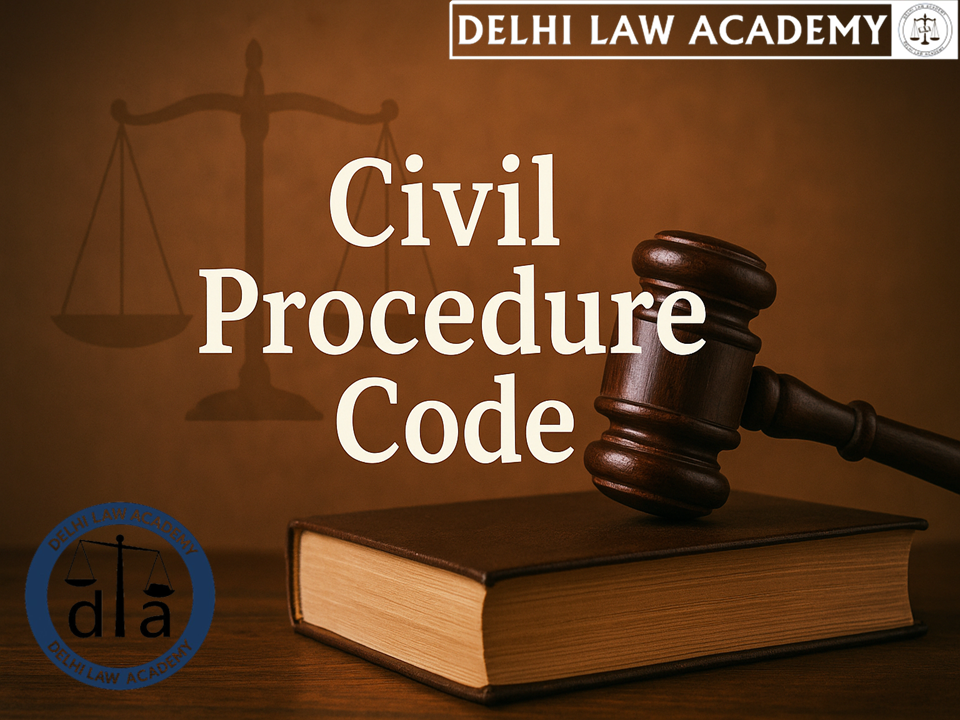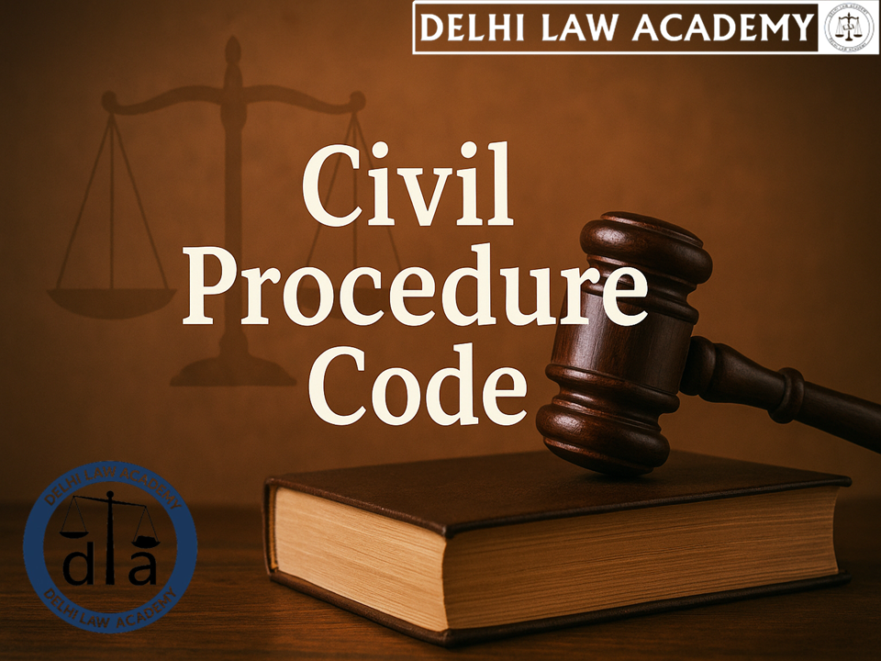
⚖️ CIVIL PROCEDURE CODE : RES JUDICATA (SECTION 11 CPC) ⚖️
📘 TOPICS
- The Law of Res Judicata
- The general principle of res judicata
- Constructive res judicata
📜 SUPREME COURT JUDGMENTS ON SECTION 11 CPC
- State of UP v. Nawab Hussain [1977 SC]
- Narayana Prabhu Venketeswara Prabhu v. Narayana Prabhu Krishna Prabhu [1977 SC]
🏛️ PRIVY COUNCIL JUDGMENT ON SECTION 11 CPC
- Kumaravelu Chettiar v. T P Ramaswami Ayyar
🎯 Preparation for RJS, DJS, PCS (J) and other Judicial Service exams
CIVIL PROCEDURE CODE EXPLAINED
The Civil Procedure Code forms the bedrock of any and every Judicial Service exam in the country. Its thorough knowledge is a must for all aspirants of RJS, DJS, PCS (J) and every other Judicial Service exam. To help such aspirants, DELHI LAW ACADEMY JAIPUR has launched a series of study material modules on all important aspects of this vital part of their syllabus:
⚖️ RES JUDICATA (Section 11)
- No Court shall try any suit
- in which the matter directly and substantially in issue
- has been directly and substantially in issue in a former suit between same parties
- in a Court competent to try such subsequent suit and has been heard and finally decided by such Court
📘 Explanation I
- “former suit” shall denote a suit
- which has been decided prior to the suit in question
- whether or not it was instituted prior thereto
📘 Explanation III
- In the former suit:
- the matter must have been alleged by one party and either denied or admitted, expressly or impliedly, by the other
📘 Explanation IV
- Any matter which might and ought to have been made ground of defence or attack in such former suit shall be deemed to have been a matter directly and substantially in issue in such suit
📘 Explanation V
- Any relief claimed in the plaint which is not expressly granted by the decree shall be deemed to have been refused
📘 Explanation VI
- Where persons litigate bona fide in respect of a public right or of a private right claimed in common for themselves and others, all persons interested in such right shall be deemed to claim under the persons so litigating
📘 Explanation VII
- Provisions of this section shall apply to a proceeding for execution of a decree. References to any suit, issue or former suit shall refer to a proceeding for execution of decree, question arising in such proceeding and a former proceeding for execution of that decree
📘 Explanation VIII
- An issue heard and finally decided by a court of limited jurisdiction competent to decide such issue shall operate as res judicata in a subsequent suit, notwithstanding that such court of limited jurisdiction was not competent to try such subsequent suit or the suit in which such issue has been subsequently raised
📘 Explanatory Notes from DLA on Explanation VI
Privy Council in Kumaravelu Chettiar v. T P Ramaswami Ayyar:
Explanation 6 is not confined to cases covered by Order 1, Rule 8 but extends to include any litigation in which, apart from the Rule altogether, parties are entitled to represent interested persons other than themselves.
Supreme Court in Narayana Prabhu Venketeswara Prabhu v. Narayana Prabhu Krishna Prabhu [1977 SC]:
In a partition suit each party claiming that the property is joint, asserts a right and litigates under a title which is common to others who make identical claims. If that very issue is litigated in another suit and decided we do not see why the others making the same claim cannot be held to be claiming a right ―in common for themselves and others. Each of them can be deemed, by reason of Explanation VI, to represent all those the nature of whose claims and interests are common or identical. One of the tests in deciding whether the doctrine of res judicata applies to a particular case or not is to determine whether two inconsistent decrees will come into existence if it is not applied. We think this will be the case here.
📘 Explanatory Notes from DLA on Section 11
- The Law of Res Judicata: It is a rule of evidence which prohibits the reassertion of a cause of action. This doctrine is based on two theories:
- finality and conclusiveness of judicial decisions for the final termination of disputes in the general interest of the community as a matter of public policy
- interest of the individual that he should be protected from multiplication of litigation
- The general principle of res judicata: A cause of action which results in a judgment must lose its identity and merge in the judgment when pronounced. It cannot survive the judgment or give rise to another cause of action on the same facts.
- Constructive res judicata: Covers issues or facts which are part of the subject matter of litigation and could have been raised. Prevents abuse of the court process by starting new proceedings on the same matter.
- Section 11 CPC: These rules culminated in Section 11 CPC. They apply to suits and former suits and, while not directly applicable to petitions for high prerogative writs, the principles are used in renewed writ applications.
📚 Source:
State of UP v. Nawab Hussain [1977 SC]
📚 Continue Your CPC Preparation
Don’t stop here! Strengthen your knowledge of the Civil Procedure Code with our other fully solved tests:
📘 Free Study Material for Judiciary Aspirants!
Download our FREE study material prepared by Delhi Law Academy’s expert faculty.
❓ Frequently Asked Questions on Section 11 CPC – Res Judicata
Contact us
📍 Delhi Law Academy – Jaipur Branch
6C, Tower 2, Coaching Hub, Pratap Nagar, Jaipur – 302033
📞 Phone:
+91 9911916552
+91 8447285606
✉️ Email:
contactus@delhilawacademy.com

